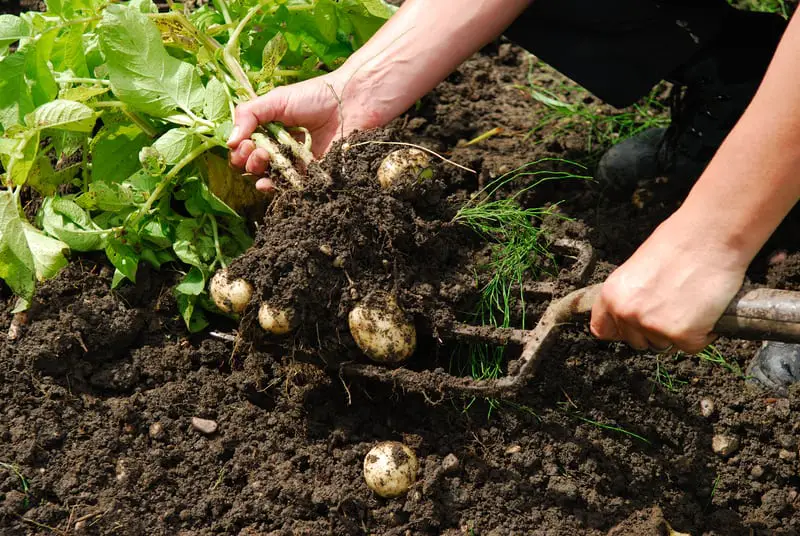As gardeners, we are always seeking the best nutrients for optimal plant growth. When it comes to growing potatoes, one amendment we may consider is mushroom compost. But do potatoes really benefit from this dark, rich material? Let’s take an in-depth look at the pros and cons of using mushroom compost for potatoes.
What is Mushroom Compost?
Mushroom compost, sometimes called “spent mushroom substrate,” is a byproduct of commercial mushroom production. After mushrooms are harvested, the remaining growing medium is pasteurized to kill fungi and bacteria. This compost is then sold as a soil conditioner.
The ingredients vary between mushroom farms but typically include
- Straw
- Poultry manure
- Gypsum
- Peat moss
- Corn cobs
- Cottonseed meal
- Cocoa shells
This nutrient-rich blend provides an excellent medium for mushrooms But how does it fare for our potato crops?
Benefits of Mushroom Compost for Potatoes
There are some clear advantages to using mushroom compost when growing potatoes:
-
Organic matter – The compost introduces beneficial organic materials into the soil. This improves structure and water retention.
-
Nutrients – Mushroom compost contains nitrogen, phosphorus, potassium and micronutrients from the manure and other ingredients. This feeds soil microbes and your crops.
-
Soil life – The compost inoculates soil with microorganisms like bacteria and fungi. These break down organic matter into plant-available nutrients.
-
Water holding capacity – The peat and other organic parts of mushroom compost act like a sponge to hold moisture. Potatoes need consistent soil moisture.
-
** weed suppression** – As mulch, mushroom compost can block light to prevent weed seeds from germinating. Less weeding means less damage to potato roots and tubers.
-
pH level – Mushroom compost tends to have a neutral to slightly alkaline pH, which potatoes prefer. It counteracts acidic soil.
Potential Drawbacks of Mushroom Compost
However, there are also some potential disadvantages of using mushroom compost for potatoes:
-
Salt content – Some compost has high salt levels from the ingredients used. This can burn plant roots if excessive.
-
Depleted nutrients – Since it has already grown mushrooms, some nutrients like nitrogen get used up. Fertilizer may be needed to replenish.
-
Water demands – The higher organic matter can lead to drying out quickly during hot, dry periods. More frequent irrigation may be required.
-
Weed seeds – Lower quality mushroom compost may contain viable weed seeds that will sprout.
-
** mold** – If incompletely pasteurized, active fungi and mold can remain. This can spread blight-causing organisms.
-
Cost – Purchased mushroom compost can be more expensive than homemade compost.
Best Practices for Using Mushroom Compost on Potatoes
To maximize benefits and avoid potential issues, follow these tips:
-
Test mushroom compost pH and salt levels before use.
-
Add fertilizer like alfalfa meal to supplement nutrients.
-
Mix compost 50/50 with garden soil or coconut coir for better drainage.
-
Add compost to planting furrows, not directly on seed potatoes.
-
Water newly planted potatoes daily until sprouts emerge.
-
Side dress growing plants with extra compost as mulch halfway through season.
-
If fungi problems occur, discontinue use of that compost source.
The Verdict on Mushroom Compost and Potatoes
When used judiciously, mushroom compost offers clear benefits to the soil food web and moisture retention. While not a complete fertilizer itself, it is an excellent amendment for nourishing potatoes when paired with additional nutritional inputs. Test new sources for quality and blend into high-quality potting mixes for best results. With a bit of trial and error, mushroom compost can be a winner for your potato patch!
Plants That Do Not Like Mushroom Compost – Quick Guide
- The Ultimate Guide to Growing Strawberries in Raised Beds - August 8, 2025
- No-Dig Garden Beds: The Easiest Way to Grow a Beautiful Garden - August 6, 2025
- How to Protect and Preserve Wood for Raised Garden Beds - August 6, 2025

